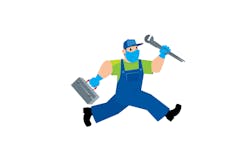Best practices to keep COVID-19 at bay in maintenance shops
Few things have stayed the same during the COVID-19 pandemic. Many more people work from home (if they were able to keep their jobs). And no one can really predict what next month will look like, let alone next year. But trucks’ tires still wear out. Their engines still require maintenance. That much is known.
But what isn’t is how repair and service shops can keep from being their neighborhood’s next outbreak hotspot? People are coming and going, maybe to work in the shop or to pick up or drop off vehicles. They may have just come from the hospital or a grocery store, places where the public still congregates and the novel coronavirus can hop from host to unsuspecting host.
During the Truckload Carriers Association (TCA) webinar “Maintenance Procedures in Uncertain Times” held on April 17, the questions surrounding how to keep a safe and functioning shop were addressed by a panel of maintenance experts and executives. This included Dick Hyatt, CEO of Decisiv, Inc.; Kevin Bergman, director of fleet maintenance for Prime Inc.; and representing Canada, Mike Gomes, vice president of maintenance at Bison Transport.
Immediately, the group pointed out some cause for concern.
“I'm really worried about our traffic,” said Bergman, noting a service decline of 30%. Prime’s shops support various equipment in the fleet of 7,000 trucks and 11,000 trailers, and he said in Missouri alone, they typically service 1,500 trailers weekly. “With 30% down, you're talking 500 trailers a week that we don't see that we used to see.”
Prime’s data indicate that 40% of trailers need service though, and if this pace is kept, the maintenance deficit breaks down to 800 trailers a month delaying some sort of service. Overall, demand has dropped 15 to 35%.
“It is going to cause demand that is going to be hard to take care of,” Bergman said.
Gomes pointed out Bison has an easier time as their tractors and trailers pull into their terminals more often. “We're really keeping a tight eye on planning to make sure that we're bringing [equipment] in at the right time, and then putting the resources to it and being effective as well as efficient,” he said. Bison is also “making sure we're not doing anything early just to keep shops busy.”
They covered a lot of ground on best practices and challenges, but here are some of the key elements.
Digitizing paperwork
Hyatt’s company Decisv makes service relationship management (SRM) software to record and share vehicle maintenance data. He said the platform has 40,000 users and tracks 3.5 million service events a year. Records and receipts can signed and stored on a tablet or other mobile smart device, eliminating the need for a technician and trucker to ever pass a clipboard to each other or require face-to-face communication, thus reducing the risk of transferring coronavirus spores.
“A service event is not handled by a single person, but it's handled by multiple people,” said Hyatt, noting how a job jacket, or service folder, can hold several files and photos, each from a different work station. The data become more accessible and events are easier to track and trace.
“There’s less paper, less physical interactions and [fleets and shops] have a long-term record of these things,” Hyatt said.
Moving to paperless records also has the added benefit of pushing shops to begin or expand their digital transformation.
“This is a real interesting opportunity to move to a new normal, which I think everybody really wanted to move towards,” he said, “which is digitization of these different processes.”
Social Distancing
When truckers come in, Prime records their temperature and asks a series of five standard questions relating to travel and possible contamination. From there, they may immediately turn the driver away or possibly administer a COVID-19 test.
“This is our first line of defense and our most important,” Bergman said.
With the practices in place, he notes that employees “getting the virus outside of Prime is actually probably more likely than them getting it in one of our shops.”
And if they do bring it to work, the strategy is to “limit and mitigate.”
Technicians are sorted into groups of four or five to take meals and breaks together. This way, if one person gets sick, they infect only those in their silo, not the whole shop. To further this goal, there’s a 30-minute buffer between shift changes, so the morning and night crew never interact and departments are split up so only half are ever exposed if a member contracted COVID-19.
“We can limp by with that,” Bergman said. “We cannot limp by with losing our entire tractor shop or our entire trailer shop.”
Bison staggers their breaks and took tables and chairs out of the break room to limit the amount of people who can be in there. And drivers have limited access to the facilities, which require a keycard to enter.
Getting employees to remember to social distance during meetings is more challenging. “You get a group in a shop, and then there's that tendency to congregate,” Gomes said. To combat this, management encourages conversation about the subject and reinforces why it’s important to maintain proper separation.
“Even though we keep that six-foot distance, there is the need sometimes for that extra pair of hands support to lift something heavier,” Gomes said. “You can encroach on someone's territory so we asked them in that situation, that they’re wearing the full face shields, gloves are always worn and sanitizer is being supplied in in mass quantities as well.”
Personal Protective Equipment
Bison has made N95 masks and face shields available, though they are difficult to wear at length while performing physical tasks, so Gomes estimated they are worn about 20 to 25% of the time.
Prime is expecting masks to arrive this week.
“I'm just not 100% confident the vast majority of our associates will wear them,” he said. “I had to wear them for a couple hours the other day, and by the end of that two hours, I was dying to get that thing off.”
Employees all do wear rubber gloves, and Prime does employ a generous amount of GermX and Lysol to surfaces, Bergman said.
Time Off
Prime has taken a very cautious approach to employee safety.
If a technician or other associate coughs or even has sore throat, they are told to stay home and still get paid.
“If an associated has a wife or a child that has pre-existing conditions like a low immune system, we also told them to stay away for the entire pandemic period, and we'll continue to pay them,” Bergman said. “It's a lot better you take that precaution than get one of their family members really sick.”
Bergman said he was skeptical about the policy, which some could easily take advantage of.
So far, that seems not to be the case.
“I just couldn’t be prouder,” Bergman said of Prime’s crew.
He believed the reason for the policy’s success was instilling a sense of pride for being an essential employee during such a challenging generational moment, and for a company willing to protect its workers.
“I think it only solidifies it when they drive down the road and go across the mall parking lot empty and nobody is working,” Bergman said.
About the Author
John Hitch
Editor
John Hitch is the editor-in-chief of Fleet Maintenance, providing maintenance management and technicians with the the latest information on the tools and strategies to keep their fleets' commercial vehicles moving. He is based out of Cleveland, Ohio, and was previously senior editor for FleetOwner. He previously wrote about manufacturing and advanced technology for IndustryWeek and New Equipment Digest.

